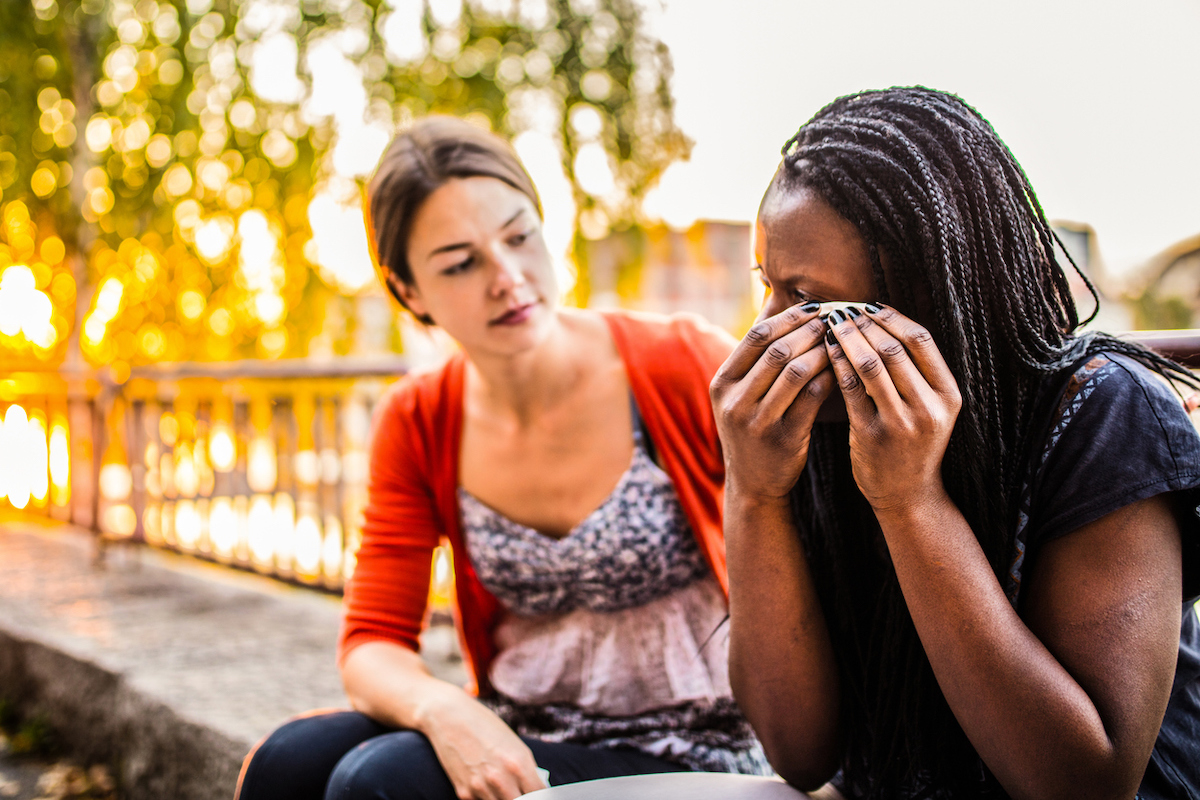This Is the Worst Thing You Could Say to Someone Who’s Grieving

When someone is grieving a loss, you only want to comfort them. But it can be hard to know the right thing to say to a friend or family member in such a vulnerable moment. And even our best-intended comments could come off as hurtful if we don’t choose our words carefully. Of course, preparedness helps. So we talked to experts in grief and communication to help understand which words hurt, and which ones are better alternatives. In regards to the former, according to the experts, there’s one phrase you should never say to someone who is grieving: “Everything happens for a reason.”
While on its face, this comment is intended to reassure, it actually can have the complete opposite effect. “Variations of this phrase are probably top five when it comes to grief responses, yet it’s the least warm and nearly void of emotion. Using a stock phrase like this can indicate lack of thoughtfulness and feel isolating rather than comforting,” says licensed mental health counselor Danielle Friedman of Free Space Counseling. “While there is value in trying to create meaning from loss, it’s not during the beginning stages of grief. And even if you can create a meaning that is valuable from your loss, saying that there was a reason carries with it that the loss was correct rather than a tragedy.”
St. Joseph’s College assistant professor Thomas DiBlasi, a licensed clinical psychologist, agrees. “These statements are invalidating and downplay what the person is experiencing,” he says. “The implicit underlying message is that the individual should not be upset. Instead, the best approach is to validate the individual and let them know you are there for them.” Read on for more expert-backed tips on what not to say to someone who’s grieving. And for more words to avoid for the sake of sensitivity, check out This Is the One Word You Should Never Say to Someone With Anxiety.
1
“They’re in a better place.”

Even if the mourning person’s belief system aligns with this idea, hearing it in times of grief is rarely comforting. “Acknowledging the loss and offering condolences simply by saying you are sorry is usually a preferred response,” says Cassandra LeClair, senior lecturer in the department of communication studies at Texas State University. “People often say things that are dismissive of the another person’s feelings and experiences. The person providing support wants to respond and be helpful, but it is often more helpful to simply say you are sorry or to offer to be there to support them.” And for more on why being a good friend matters, Here’s Why It’s Healthier to Have Better Friends Than More Friends.
2
“I know how you feel.”

This notion is meant to express empathy, but it can fall flat—even if it’s fully sincere. “Even if you have experienced a loss, this comes off as not being sympathetic,” says certified hypnotist Eli Bliliuos of NYC Hypnosis Center. He suggests the better alternative would be to say something like, “I have suffered a loss recently as well. Let me know if you want to talk about how you are feeling.” And if you feel like you’re offending people often, check out the Signs You Could Be a Narcissist, According to Experts.
3
“What can I do to help?

This is meant as an offer of help, but a small tweak makes it much more comforting at a time of grief. “Although well-intentioned, these words put the onus on the griever to think of ways you can help them in a time when they most likely already feel overwhelmed, confused, and burdened,” says clinical and organizational psychologist Nicole Lipkin, the CEO of Equilibria Leadership Consulting. “Instead of asking how you can help or what someone needs, just do something kind and helpful like sending a meal, hiring a cleaning service or chore service to help with household tasks, [or] visit with them and spend time.”
4
Nothing at all.

If you’re afraid of saying something wrong, you might decide the better path is to just avoid communication altogether—but it’s not. “One of the worst things you could say to someone who’s grieving is nothing,”explains Peg Sadie, psychotherapist and self-care coach. “Not knowing what to say can feel uncomfortable, but avoiding their grief by not acknowledging it only adds to their feelings of loss and isolation. Ask them questions about their loved one. Most people are afraid to bring up loved ones that have passed thinking it’ll make someone feel worse, but it’s a very healing part of the grieving process. It helps to have someone willing to listen.” And for more guidance on navigating life’s many challenges, sign up for our daily newsletter.